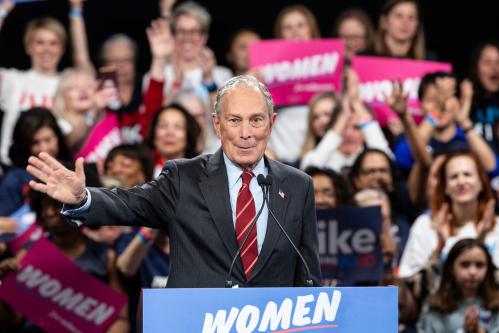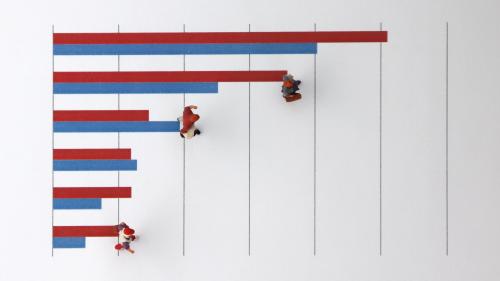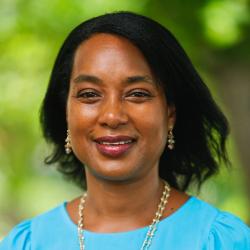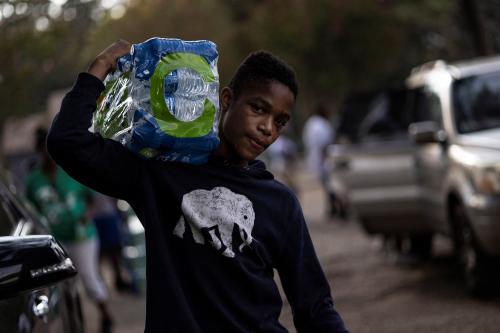On April 6, 2022, Camille Busette, Ph.D., Senior Fellow in Governance Studies with affiliated appointments in Economic Studies and the Metropolitan Policy programs at The Brookings Institution, testified before the House Ways and Means Committee during a hearing entitled, “Overcoming Racism to Advance Economic Opportunity.” In her testimony, Busette’s discussed the importance of a new policy framework to create an equitable future for the United States.
Chairman Neal, Ranking Member Brady, Members of the Committee, it is both humbling and a great responsibility to be asked to testify at today’s historic hearing. Thank you for the opportunity to do so.
The United States is the largest and most robust economy in the world. That economic strength has been built on world-class productivity, innovation, energy and agricultural production, an impressive service sector, and strong consumer demand. The policies that have enabled our strong growth economy, particularly those that have built a thriving middle class, have entailed choices. Those choices, made over the last century and a half, were made in a context in which the value of a human being living in the United States was evaluated against a hierarchy of skin color and cultural references. And the policy choices that were made in that context conformed to that hierarchy of human value. Our Indian Removal Act of 1830, Chinese Exclusion Acts of 1875 and 1882, Japanese American internment camps, and Jim Crow laws are all examples of policy choices that enshrined racist assumptions in public policy with consequences for children that have spanned generations. As a result of those choices made under those assumptions, the United States is also a place where a child’s future is currently determined by skin color and ZIP code.
As the wealthiest country in the world, it is paradoxical that we have not trained sufficient resources on investing in blighted neighborhoods or rural communities, not to gentrify them, but to provide children living there with activities, yards, parks, great schools, ubiquitous broadband, stable housing, and access to affordable mental and physical health care. Our patchwork of social service programs acts to blunt the worst effects of poverty, but in a nation as wealthy as ours, those social programs are not designed to put families on the path to economic mobility. In fact, as we sit here today, we are mere minutes from southeast Washington, D.C., an area where thousands of potential Benjamin Bannekers and Kizzmekia Corbetts live, but for whom those aspirations are highly likely to remain unrealized.
Who wins when we have blighted neighborhoods? What consumer-facing business would support having predominately Black and Brown neighborhoods where, one day, the children living there will not be able to afford the goods and services offered by these businesses? Who wins when access to health care is so poorly distributed that health outcomes, life expectancy, and yes, COVID-19 infection rates make those areas look like developing or emerging economies?
If you take nothing else from my testimony today, I do want you to remember this. First, we all suffer when children experience racial disparities. Second, racial and ethnic disparities in the U.S. are the results of conscious policy choices and third, we have all the resources to undo those choices and make better ones that demonstrate that the United States, long a beacon of hope and freedom, is one that is continuing to gain momentum toward the founding concept that “All men are created equal.”
Today we find ourselves confronting the many consequences of these policy choices shaped by assumptions about race and culture. Given our limited time here together, I will focus on two of those consequences: wealth and health disparities. And I am sure that my impressive colleagues at this hearing will augment and enhance our discussion.
Continue reading the full testimony here. Watch the full video of Camille’s testimony (starting at the 34:35 mark) and the rest of the hearing below.
The Brookings Institution is committed to quality, independence, and impact.
We are supported by a diverse array of funders. In line with our values and policies, each Brookings publication represents the sole views of its author(s).





Commentary
TestimonyOvercoming racism to advance economic opportunity
Dr. Camille Busette's testimony before the House Committee on Ways and Means
Wednesday, April 6, 2022